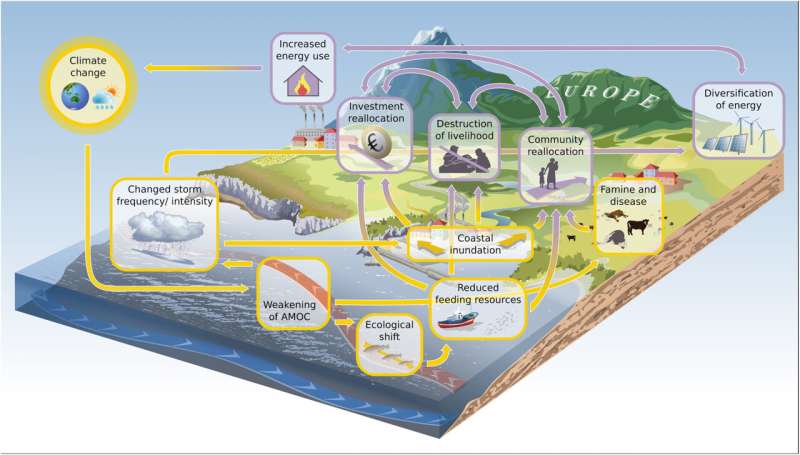This article has been reviewed according to Science X's editorial process and policies. Editors have highlighted the following attributes while ensuring the content's credibility:
fact-checked
peer-reviewed publication
trusted source
proofread
Solving the climate crisis requires collaboration between natural and social scientists, says study

Now that the world has experienced its hottest day in history, it is more urgent than ever for natural and social scientists to work together to address the climate crisis and keep global temperature increases below 2°C.
To this end, an international group of researchers recently published an innovative research paper that highlights the importance of integrating knowledge from natural and social sciences to inform about effective climate change policies and practice. They argue that the concept of tipping points can serve as a bridge between these fields of study, facilitating a comprehensive understanding of climate change processes and impacts.
The group, led by the Institute of Environmental Science and Technology at the Universitat Autònoma de Barcelona (ICTA-UAB), includes researchers from other scientific institutions in Australia, Italy, Spain, France, Germany, and Portugal. The paper is published in the journal People and Nature.
Traditionally, natural scientists have focused on documenting and analyzing changes in the natural environment, such as rising global temperatures, altered rainfall patterns, and extreme weather events. More recently, natural scientists have questioned whether the changes we are witnessing are reversible and if there is a tipping point at which, no matter how much we curb our greenhouse gas emissions, the environmental changes will be permanent.
However, the research team asserts that these environmental considerations must be accompanied by an exploration of social dynamics, encompassing individual, collective, and societal behaviors. To ensure a sustainable future, it is imperative to comprehend the intricate interaction between environmental and social changes.
The researchers pose critical questions: Who benefits from and contributes the most to the current trajectory? What alternative and desirable scenarios exist, and how can we intentionally work towards them? Are there social tipping points that could help us rapidly change our practices, norms, and institutions towards those scenarios?
To show the value of studying social and climate tipping points together, the team focuses on the climate change-induced slowdown of the Atlantic Ocean currents, which resulted in the devastating flooding of the Ahr Valley, in Germany. Through this example, they demonstrate how extreme weather events impact local communities and how these communities adapt their ways of life to cope with future extreme events.
The integrated analysis of environmental and social changes allows for an understanding of the complex interaction between climate change and society and enables the assessment of whether our responses benefit everyone, or only a few. Furthermore, it allows for the evaluation of the consequences of human responses at different scales, whether local, national, or international.
The researchers assert that by fostering collaboration between natural and social scientists, the collective capacity to address the climate crisis is enhanced. Their work underscores the critical need for a multidisciplinary approach that combines knowledge from both fields to develop comprehensive solutions and shape sustainable policies for a better future.
More information: Sonia Graham et al, An interdisciplinary framework for navigating social–climatic tipping points, People and Nature (2023). DOI: 10.1002/pan3.10516
Journal information: People and Nature
Provided by Autonomous University of Barcelona




















